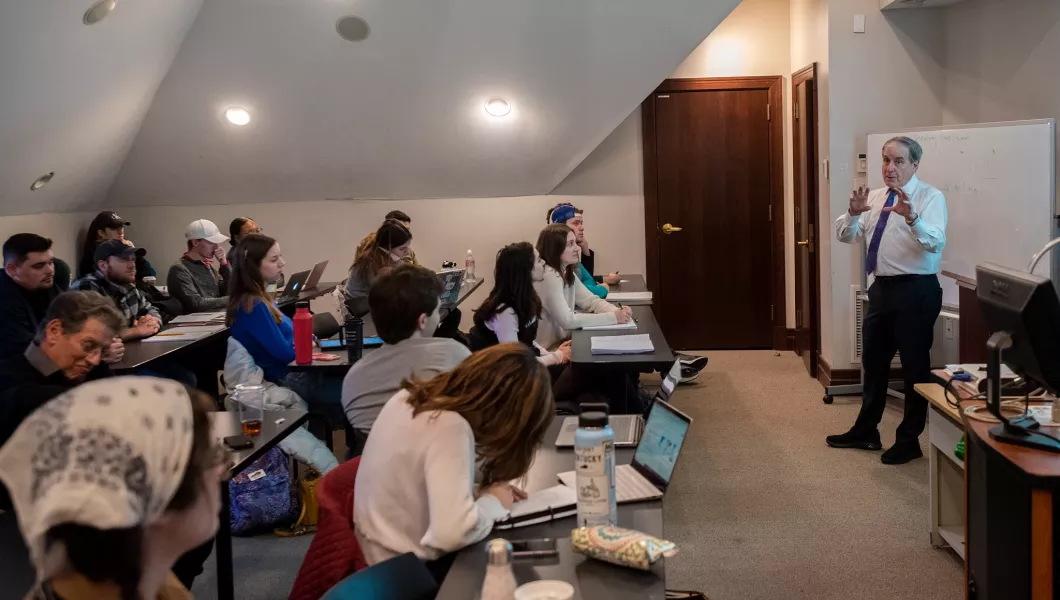Introduction to the Culminating Undergraduate Experience
Introduction to the Culminating Undergraduate Experience
In its QEP proposal to SACS-COC, the University of Louisville outlined its intention to require every undergraduate to apply critical thinking skills in a culminating undergraduate experience through its initiative Ideas to Action.

Ideas to Action (i2a) is designed to strengthen undergraduate education by improving instruction in critical thinking in the general education courses and the majors and to provide all undergraduates with the opportunity to apply critical thinking skills in a culminating undergraduate experience (CUE) such as a capstone course, service learning project, research project, internship, practicum or other activity.
The overall purpose of this component of the University of Louisville undergraduate experience is to explore and demonstrate the connections between well cultivated critical thinking and its application in the CUE experience. Visit the CUE development page to read more about i2a’s process of implementing culminating undergraduate experiences.
CUE Assessment
CUE assessment tools are available for instructor, program, and departmental use. They include:
- CUE Student Reflection [PDF]
- CUE Student Evaluation [PDF]
- CUE Faculty Evaluation [PDF]
- CUE Student Reflection Rubric [PDF]
Frequently Asked Questions
The Culminating Undergraduate Experience is an activity, experience and/or course located in students’ program of study in which they illustrate the use or enhancement of their critical thinking skills.
It’s a senior-level, applied learning, capstone-like experience understood to be the culmination of a student's learning experiences, the application of the critical thinking skills, and the opportunity for students to work toward "creating solutions to real-world problems."
To be a CUE, it must be designated by the program of study and be identified and credentialed by the curricular review processes established in the specific unit.
Early Development/Definition Phase - January 2008-April 2009
- A group of cross-departmental faculty begin to explore the dimensions and components of culminating experiences and commonalities in their courses.
- The Culminating Experiences Subcommittee develops a working draft of the culminating experiences defining features and assessment instruments.
- A few courses begin to pilot the CE documents in Summer 2009.
Piloting CUE Defining Features Phase - August 2009-April 2010
- The Faculty Learning Community on Culminating Experiences (FLC-CE) is launched as a year-long program in which faculty from across undergraduate programs "test drive" the new CE structures in their courses.
- The i2a Task Group approves revision to the title of this component to be the CUE, Culminating Undergraduate Experience.
- The Culminating Undergraduate Experiences Subcommittee fleshes out a set of criteria to inform unit/program adoption and adaption for CUE requirements.
Early Implementation Phase - August 2010-April 2012
- A second year- long Faculty Learning Community on Culminating Undergraduate Experiences (FLC-CUE) is held. Faculty from across undergraduate programs develop and pilot CUE criteria and defining features in their courses.
- i2a Task Group approves the CUE assessment documents and CUE Defining Features.
- All unit facilitators participated in a workshop designed to assist and support the CUE implementation plan which includes the target goal for each unit to have 50% of programs’ CUE implemented by Spring 2013.
- All units report on CUE implementation plans, including affirming the target goal of 50% by Spring 2013.
- All units report CUEs in every program, summer 2014.
- Capstone-style course
- Service/internship experience
- Independent study or original research project
- Practicum experience
- Senior honors thesis
- Credit-bearing course or equivalent unit graduation requirement (e.g. Music Studies graduation requirement of Principal Ensemble Performance)
- Preparation and taking of certification, licensure, or other professional standard exam or respective "Subject Test" for the Graduate Record Examination
- Individual program and unit will be responsible for designating what experiences/courses count as CUEs.
- Procedures and processes for identifying a course or experience as a CUE were finalized by the CUE subcommittee in Spring 2011.
- Individual Units are responsible for providing processes for CUE identification and approval for the programs of study within their respective Units. These processes have been fully in place since Spring 2013.
- Any exception to this designation is at the discretion of the unit curriculum decision-making body.
